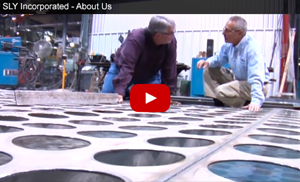Air pollution management is important. With particulate matter linked to over 30,000 deaths a year in the US alone, air quality control systems are essential to keeping manufacturing environments cleaner and safer. The Clean Air Act clearly shows the federal pressure we all face for a cleaner (and safer) work environment, but it’s not just government legislation that guides our hands. Private investors, tech inventors, and corporations alike all want cleaner processes.
The takeaway is simple: we need to increase air quality control across all industries. Here at Sly, with over a century-and-a-half’s experience in air pollution control (APC), we know just how to do it. To help the leaders of today, these are our top five ways to increase industrial air quality control:
- Properly Assess Your Air Quality. Before you pick the right system, you need to know what pollutants you’re creating and the quality of your air. For instance, if you are dealing with dry particulate, you need to understand the characteristics of the dust being filtered. That all starts with a measurement of bulk density (g/cm3) and particle size distribution (μm). Bulk density data can be used for the diagnosis of re-entrainment or aid in the design of any fabric filters used in your APC equipment. Determining your particle size distribution allows you to predict APC system performance in applications where similar dusts are found. Knowing the dust’s level of abrasiveness and tendency to agglomerate will also let you know how likely it will lead to uncontrolled buildup, caking, bridging, or lumping.
 Evaluate Your Current System. Once you know what kind of particulate you’re dealing with, you need to measure how well your current APC system is removing or minimizing pollutants. Air quality monitoring devices are a must here, allowing you to keep a record of how your system is performing. Failure analysis tests are also important to make sure the components of your system are performing up to standards. Baghouse systems in particular benefit from regular filter bag failure analysis. Considering the five modes of filter failure – mechanical strength/wear, thermal degradation, chemical degradation, dust penetration/media blinding, and incorrect design – failure checks can diagnose the source of your problem and recommend the appropriate corrective action. Not only can this help to reduce total system operating cost, but it can also improve the performance of your filter media in terms of lower emissions and higher airflow.
Evaluate Your Current System. Once you know what kind of particulate you’re dealing with, you need to measure how well your current APC system is removing or minimizing pollutants. Air quality monitoring devices are a must here, allowing you to keep a record of how your system is performing. Failure analysis tests are also important to make sure the components of your system are performing up to standards. Baghouse systems in particular benefit from regular filter bag failure analysis. Considering the five modes of filter failure – mechanical strength/wear, thermal degradation, chemical degradation, dust penetration/media blinding, and incorrect design – failure checks can diagnose the source of your problem and recommend the appropriate corrective action. Not only can this help to reduce total system operating cost, but it can also improve the performance of your filter media in terms of lower emissions and higher airflow.- Choose the Right System and Customize it to Your Needs. Every system has unique needs. Whether you choose to upgrade your current system or go with a new one, you should tailor your APC equipment to your specific industrial environment. Look for a team of experienced engineers and designers that will gauge your environment to help to anticipate problems before they happen, providing you with the right design, specs, and detailed engineering drawings for your custom system. Take a look at this case report where we replaced a worn, noncompliant unit with a custom dust collector.
 Be Proactive in System Maintenance. Nothing is worse than having a system failure due to a small, avoidable issue. Proper system maintenance requires you to regularly check up on your system, both with automated diagnostics from ambient pollution monitoring and manual performance tests from on-site engineers. No matter how you find a problem, make sure you take the proper steps to diagnose and correct it before you have to shut down production, or worse, deal with the consequences of a dust explosion.
Be Proactive in System Maintenance. Nothing is worse than having a system failure due to a small, avoidable issue. Proper system maintenance requires you to regularly check up on your system, both with automated diagnostics from ambient pollution monitoring and manual performance tests from on-site engineers. No matter how you find a problem, make sure you take the proper steps to diagnose and correct it before you have to shut down production, or worse, deal with the consequences of a dust explosion.- Choose the Right Partner. With something as important as air quality control, you need a reliable partner that will take the time to make sure your APC system is the best that it can be. With our custom flexibility, meaningful emission guarantees, and trained engineers on staff, Sly is the right partner for the job. Our service to you doesn’t stop after handing off the quote. We are committed to getting you the right equipment and then helping you maintain it with our large catalog of replacement parts for all makes and models.
All of these add up to one goal: better air quality. By following these steps to increase your own industrial air quality control you’ll be putting your best foot forward for a safer and cleaner work environment.
Tags: dust collector system




